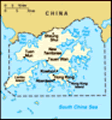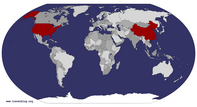Advertisement
Published: June 29th 2008

 Entrance
Entrance
You can see the shaven trees, it is still before Springs blossoming. But all scraps are used for cooking or other purposes"Why do you bow?"
I asked the guest master monk sitting across from me. Light flows through the window and the open door. From the forested Hong Kong hills fresh, cool, early spring air meets our noses as we sit. We sit at a table near the corner. This room is where guests 'register' to stay in the temple area; the guest master's house. Large book cases filled with giant encyclopedia like books, the whole library of Zen scripture and commentary, along with hundreds of other books line the back and opposite wall. Pictures of monks and masters, a wood carving of an old, enlightened master's thin, long, thoughtful and wrinkled face, a long scroll hangs on the wall bearing one extended ink-black character "Fo" which means 'Buddha.' In the center of the room is an encased golden statue of some Bodhisattva. Fruit, incense, orbs of crystal, a wacking stick all line the alter. A small bowing stool sits before the altar near to the empty floor.
By fate or fortune I found this, the only temple in Hong Kong that both accepts temporary guests and practices meditation every day; fitting that these two would go together is it

 Alley towards home
Alley towards home
The house I stayed in was back through there, but this house on the left is the guestmasters quarters. Through that window there is the table where we sat and had many a chat.not? But before I am allowed to live in the temple I must bow; hence my question. He pondered the sincere and searching question. He looks young but is actually 40, sitting there in his light grey gown, casual, but in his face one sees reflective thinking. A thin face, a thin man, but tall and stern, serious, did I mention young looking? His eyes are open, bright brown and clear; there it is seen: he is a sincere seeker of truth. After finding the answer in his mind he responds, in clear English, with intense, slow, enunciated words as if in declaration to himself, "To kill my ego."
Great response. I must have smiled. The monk had great energy, or he spoke with energy and sincerity. He is clearly a sincere practicioner of Buddhism (one desiring enlightenment); such a one is rarer to find among an ocean of monks than one may think. As rare as finding a Christian dedicated to being like Christ.
The conclusion was that no matter why I bowed, it didn't matter (an important implication here is the subjectivity of all religious ritual), if I wanted to stay in the temple I must

 5 little creatures
5 little creatures
I do not know the significance, and wonder if there is....such a thing is subjective anyways. But I love this photo, don't you?bow.
Solemnly, slowly, with great intent, I strode across the quiet floor. The monks eyes followed and then rested toward the floor, he was still aware of what was happening. Nothing significant, neither insignificant. Standing before the statue, mind's eye perceives and heart turns with natural appreciation and reverence towards the Infinite Creator of All. Called by some God. The Divine Parent and Original Source. Slowly, exhale as I descend to my knees and bring my face near the floor; palms facing the ceiling rest beside my head as humbly and joyfully prostrate, a symbol of humility before and worship of the Loving Spirit and Infinite Consciousness of the Universe. Arise inhaling, chills run through body, I feel the ego dying and peace purely filling the heart. Like this I bow, slowly, consciously, intentionally, two more times and after rising the third time, perform a half bow, hands still clapsed near heart, still bowing to the Lord of the Universe. If the heart is set on any once human Being, it is not the Buddha but Jesus. Verily it is through the One who came forth from the Presence that the nature of the Infinite Creator is most fully
revealed. Nevertheless, there was expressed the Will that also through this tradition and through the Buddha the monks and nuns here may be led to the realization of Spiritual Truth; ultimately the realization of the Being that we are. Without the light I cannot see myself. I arise and walk over to the monk. I have now officially entered this Chan(Zen) Buddhist Temple.
Sitting down again across from the monk, light seeping from his little smile as, seemingly, looking at the ground he is yet aware of my presence, we begin to discuss how they eat here in the temple.
When the metal clanks 'clank', 'clank', 'clank', the monks go first; the nuns file in after, quietly, innerly, entering the food hall. We sit in rows along the open center aisle which extends from the door. I sit on the bench near the door; across the aisle the guestmaster monk sits directly before me. A little 'ting' is heard. The monks begin to chant, hands in prayer position. The nuns voices angelically rise above the din, monk voices provide a bassious harmony. The food fills the bowls before me...rice, veggies, soup; fresh. Ww begin to meditate as instructed

 from the northwest gardens
from the northwest gardens
The roof of the main temple, wangta tree and hong kong mountainon the various causes and conditions that gave rise to this food: farmers sowing, reaping, plants processing, nuns preparing. We become conscious of how even the food we eat, as well as everything we experience depends on numerous conditions. Everything in the human realm is interdependent or just plain dependent. Realizing these realities of dependence and conditionality, that everything we experience, especially people, with their habits, word choices, dispositions, emotional tempermants, opinions, arises out of a mixture of many unseen soils, deepens our understanding of reality and makes room for compassion in one's heart.
I reach across the narrow table and bring the bowls closer, a sign of accpetance. It is okay to enjoy food, but the monks try not to. Why be deceived by conditioned interpretations of mere chemical signals occuring in the nervous system? A valid neurological and psychological fact: that what we call 'good taste' is just an intrained and conditioned interpretation of chemical and electrical signals occuring in the nervous system. For this reason many Chinese dislike western sweets, or sweet food altogether, and have a taste for salty foods. The monk notes: is cake any more enjoyable to humans than rotten food is to

 Temple in Spring
Temple in Spring
Ahhh the magnificence!flies?
I liked the injunction to realize that I must eat because I do not fully realize I am consciousness, I am spirit. I eat to fuel this body that houses this spirit and consciousness, to power the vehicle through which I practice and in which I come to realize who and what I am.
We eat swiftly and in utter quietude. "Burp" , "ting..ting" , the chopsticks against the bowl, a cleared throat; these are the only sounds heard in those swift 20 minutes. I ate too slow. After standing to bow to the Buddha and waiting for all to clear out, I sit again to finish my lunch amidst two nuns cleaning up an empty but full room. My experience of the temple had begun, but as I learned it neither would begin, nor end.
I often realize when reaching a destination I often interpret the situation as coming to an 'end.' Then I catch my mind midway in its thought. When I get to the bottom of the mountain, is the journey over? Life is an unending journey that just unfolds in various colors and vistas. That discriminating and divisive perspective is
misleading since all of the perceived events, or moments of our life, are woven together into one vast garment, and when the winds blow a piece of the garment, the wave is carried throughout the whole. So every event effects the whole of our life. Cultivating the intention to cooperate with God's indwelling spirit, the divine consciousness within our mind, to become aware of our mental patterns that are a product of our experiences, we can learn to adjust our thoughts that they may benefit the whole of our life situation and to unlearn those engrained patterns that can negatively effect our whole life.
That is why I am here, here in this Buddhist temple of Hong Kong. And there are other reasons. It is a transition period now, between teaching and living in China for over a year and returning to the United States. Many things were learned and habits, both good and bad, developed while being in China. The Temple is a quiet and holy space befitting for spiritual practice and reflection. One purpose was (and is) to identify and turn from (the meaning of 'repent') the negative habits that were learned without intentionally being learned. To

 Tower of Hope
Tower of Hope
This tree was named Tower of Hope. Hope for the light in all to arise and the light within Christian and Buddhist teachings to merge.commune with God through our great brother Jesus (it was easter afterall) in order to joyfully Be with the Infinite God of infinite Love, to purify the mind and heart of the negative patterns, and to identify and be filled with the spirit nature of Love. To lay stronger foundations for a renewed dedication to living the spiritual life. To understand how the experiences in China serve this lives purpose.
Nevertheless, it was found that this short stay in the temple, rather than merely serving as an isolated event that helped me to realize this life's purpose, would itself become a profound experience and part of the purpose of this life. It became an experience that made many things clear in the mind and this life as a whole. As stated earlier, any event one experiences can not be separated from the totality of one's life experience as it is perceived as happening over the course of time. The illusion of the separateness of this experience quickly dissolved as it began to unfold as just one more flower to share its fragarance in the garden of life. All is One. This, the most profound and simple truth that follows the feeling-realization of Universal Love, is realized again.
Advertisement
Tot: 0.164s; Tpl: 0.013s; cc: 13; qc: 48; dbt: 0.0566s; 1; m:domysql w:travelblog (10.17.0.13); sld: 1;
; mem: 1.2mb











George (Dad)
non-member comment
It is Good
G, It is good that you did this and I can understand why. your writing is so descriptive and makes one feel like they are there with you. Great photo's, too. You should publish some of them to the web. i can show you how to do this through www.imagespan.com when I'm out there, or you can figure it out on your own. Sounds like an interesting and revealing place and experience ... look forward to the next chapter/section.